

Employers and employees don’t always necessarily agree, and that’s certainly the case when it comes to retirement readiness, according to a survey released this week by Voya Investment Management.
One of the highlights from the survey is the significant gap between the views of plan participants and plan sponsors about employees’ readiness for retirement. Only 63% of participants said they feel somewhat or very prepared for retirement, while 87% of sponsors said that participants fall into those two categories.
The survey also found that reducing plan fees and expenses has been a focus that has grown significantly since 2021, moving from fifth place in Voya’s previous survey to third place this year.
Covid still seems to be in the rearview mirror for quite a few people, with 37% of participants who are 50 or older saying they now plan to retire later than expected as a result of the combined effects of long-term market volatility, inflation and Covid.
However, the delay has its positives, as the survey also shows an increase in investment changes by participants and an increasing demand for emergency savings benefits.
“Specialists and employers can consider these findings an opportunity to bring forward more retirement readiness support solutions, lower volatility equity options and other strategies to help employees on their path for a more secure financial future,” Brian Houston, senior vice president and business development manager at Voya Investment Management, said in the release.
Of course, plan sponsors have some concerns. Most sponsors this year were worried about reducing plan fees and expenses and helping participants transition to retirement. As for retirement plan issues, threats to cybersecurity, reasonable plan fees, managing the complexity of overseeing their plan, and reducing plan leakage due to loans and hardship withdrawals are the most pressing concerns for sponsors.
An individual’s overall financial confidence has a direct impact on retirement preparedness, Voya found. According to the research, there’s an opportunity for plan sponsors and specialists to offer more education and solutions to help participants generate income and be better prepared in retirement.
“This indicates that there is demand for additional decision support for retirement planning,” Voya said in the release. “[There] is also an opportunity for sponsors and specialists to adopt and promote these services within their retirement plan features to help drive greater financial outcomes for participants.”
Going forward, 66% of plan sponsors said they’re concerned about ensuring plan fees are reasonable. Most agreed that their advisors were effective in keeping overall plan costs reasonable. Sponsors also said they would prefer a plan advisor who can advise them on retirement income investment options, assist with investment selection, and work with participants on financial wellness.
The survey included feedback from 304 plan sponsors, 205 plan specialists and an online survey conducted among 500 benefits-eligible, employed Americans who are contributing to their employer-sponsored retirement plan.

Most firms place a limit on advisors’ sales of alternative investments to clients in the neighborhood of 10% a customer’s net worth.

Those jumping ship include women advisors and breakaways.

Firms in New York and Arizona are the latest additions to the mega-RIA.

The agent, Todd Bernstein, 67, has been charged with four counts of insurance fraud linked to allegedly switching clients from one set of annuities to another.

“While harm certainly occurred, it was not the cataclysmic harm that can justify a nearly half billion-dollar award to the State,” Justice Peter Moulton wrote, while Trump will face limits in his ability to do business in New York.
Orion's Tom Wilson on delivering coordinated, high-touch service in a world where returns alone no longer set you apart.
Barely a decade old, registered index-linked annuities have quickly surged in popularity, thanks to their unique blend of protection and growth potential—an appealing option for investors looking to chart a steadier course through today's choppy market waters, says Myles Lambert, Brighthouse Financial.
